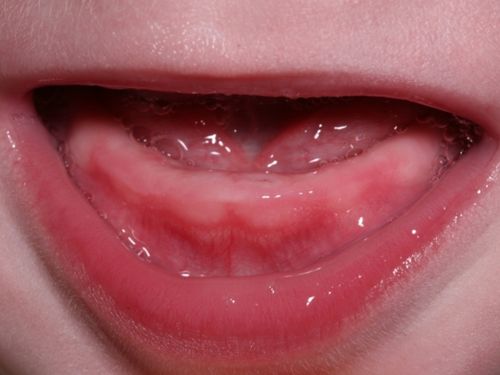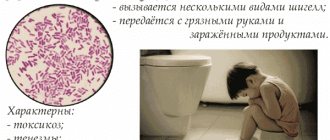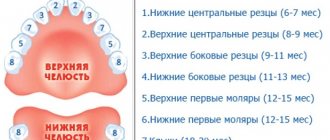Snot in a baby: how long does it last and how to treat a prolonged runny nose?
The arrival of a baby in a family is always a joy. But along with pleasant chores, parents also have other worries.
Many mothers and fathers wonder: how long does a baby’s runny nose last?
The first advice that can be given to new parents: if rhinitis appears in the baby, you need to show the baby to the doctor.
The pediatrician will be able to correctly determine the cause of concern and prescribe the correct treatment. A runny nose in a baby can appear for physiological reasons and during the development of an infectious process.
The conditions for the baby's stay in the womb are created in such a way that amniotic fluid regularly passes through its respiratory tract. Thanks to this, the unborn baby learns to breathe and swallow. Immediately after birth, the first breath occurs.
The remaining water in the upper respiratory tract causes a physiological runny nose in the infant. How long does this nom grunt last? If the baby does not immediately clear the nasal passages using a special aspirator, then the sniffling may persist for several days. A newborn will grunt for an average of 3-5 days.
A physiological runny nose in a baby can also develop for another reason. The mucous membrane of newborns is very vulnerable. At the same time, a lot of work is entrusted to it: it needs to humidify, warm and purify the air entering the lower respiratory tract. Therefore, a reflexive intensive moistening of the nasal passages occurs.
This physiological runny nose can last up to three months, but usually disappears at 8-10 weeks of a child’s life. There is no need to treat this problem. Symptoms such as sniffling, grunting during sleep and feeding, and the discharge of clear mucus from the nose will soon subside.
It is important to create the right and comfortable conditions:
- air humidity more than 50% (preferably 60-70%);
- room temperature up to 25 degrees (at night up to 23);
- regular ventilation and frequent walks in the fresh air;
- drinking plenty of fluids and properly organized feeding.
If you do not maintain the right environment, a physiological runny nose can drag on and turn into an infectious disease. However, its duration will depend on the actions of the parents.
The use of vasoconstrictor drugs prolongs the duration of physiological runny nose. Medicines should not be used unless prescribed by a doctor.
How long does a runny nose last in a baby with ARVI?
If you do not create the right conditions for the baby, the duration of the physiological runny nose will be prolonged. It is also aggravated by the fact that infections can occur. More often they are of viral origin.
With an infectious runny nose (ARVI and influenza), the sniffles are transparent, and rhinitis itself is divided into several stages:
- reflex (characterized by frequent sneezing, dryness and itching in the nose - lasts several hours);
- catarrhal (the vessels of the mucous membrane become overfilled with blood, swelling occurs and nasal breathing becomes difficult - lasts up to three days);
- recovery (the mucus discharge gradually thickens, crusts form and breathing is restored - lasts a couple of days).
How many days does a baby's runny nose last? Viral rhinitis, with proper treatment and creation of favorable environmental conditions, lasts on average 7-10 days.
If a baby's runny nose does not go away for longer, then most likely the problem is a bacterial infection. It is accompanied by the same stages as an infectious runny nose, but instead of recovery, microbes join and multiply.
Bacterial rhinitis is accompanied by nasal congestion and the formation of thick mucus. She cannot always go out on her own. With proper treatment, such a runny nose goes away in an average of two weeks.
But if bacterial rhinitis is treated incorrectly, it can become chronic..
The child's body is especially vulnerable to pathogenic flora and microbes. Therefore, with prolonged rhinitis, doctors mention the chronic form.
During such an illness, the baby’s quality of life deteriorates significantly. A long-term inflamed mucous membrane can become a time bomb.
The baby's brain does not receive enough oxygen, and memory deterioration occurs. The baby cannot learn basic things that are so necessary at the age of one year.
Chronic runny nose lasts three weeks or more. Lack of therapy leads to hypertrophy of the mucosal surface, and then atrophy. This pathology is very dangerous for babies.
It is important to correctly distinguish a viral runny nose from a bacterial one. Often their symptoms coincide. But the treatment for both problems is different. If you give a child antibiotics for a viral runny nose, you can only worsen his well-being and undermine the developing immunity.
If a baby’s runny nose doesn’t go away, what should you do?
Normally, a viral runny nose lasts a week. Less often it lasts 10 days.
In case of prolonged rhinitis, it is imperative to take measures.
Simple manipulations will help you shorten the time your baby is sick.
It is worth remembering that before using this or that medication or traditional recipe, you need to consult a doctor.
Rinse the spout
Viral and bacterial rhinitis always requires washing the mucous membranes.
Modern pharmaceutical companies produce a variety of drugs for this purpose. Saline solutions can be produced in the form of a spray or drops.
Some nebulized medications are approved for use in children from birth.
But pediatricians do not recommend using them because under pressure, pathogenic flora can enter the Eustachian tube. This will immediately provoke otitis media.
Rinse the baby's nose with Aquamaris or Aqualor drops. You can use sodium chloride solution. There are no restrictions on the use of such drugs. You can cleanse the mucous membrane with them as often as required.
Salt compositions will also show a good effect for physiological rhinitis. They will moisturize the inner surface of the baby's nose and soften the crusts.
Antiviral drops and antibiotics
Among the medications to combat the runny nose are Grippferon, Genferon and Interferon. all of them are safe and can be used from the first days of life.
Interferon drops for runny nose
Drops have an antiviral effect, creating an invisible protective shell on the mucous surface. They also increase the body's resistance through the synthesis of interferon. Such compositions should only be used with the permission of a doctor. Nasal antiviral agents can also be used for prevention.
Antibiotics for the treatment of rhinitis are not often prescribed. It is strictly forbidden to use them independently for babies. The most popular antiseptics that have an antimicrobial effect are Protorgol, Sialor, Miramistin.
Consult your doctor for recommendations on the use of antiviral medications and antibiotics.
Vasoconstrictors: friend or foe?
Infants are allowed drugs such as Nazivin, Nazol, Vibrocil.
They help relieve hyperemia and narrow the vessels of the mucous membrane.
Due to this, swelling is relieved and breathing is restored.
The drops can also dry out the inner surface of the nose. They can only be used when necessary. Vasoconstrictor compositions do not have a therapeutic effect; they are intended for symptomatic therapy.
With a physiological runny nose, the use of such nasal remedies can only aggravate the pathology and prolong its duration.
Folk recipes
The use of grandmother's methods of treating a runny nose for a baby is unacceptable.
Of course, remedies such as eucalyptus, chamomile, aloe juice, honey are good and effective.
But all of them can provoke a severe allergic reaction in a baby. Think several times before giving your baby this or that medicine without permission.
Many mothers believe that if a runny nose does not go away, it can be cured with breast milk. This is a big misconception that can cause harm to your baby. When milk enters the spout, it curdles and becomes an excellent breeding ground for bacteria.
Where does it come from, how and how it is treated, how dangerous is a runny nose in children in general – answers Dr. Komarovsky:
All you can do on your own to quickly cure a runny nose is to create comfortable conditions for your baby and regularly clean his nose with an aspirator. Treatment must be prescribed by a doctor.
Source: https://momjournal.ru/zdorove-rebenka/detskie-bolezni/skolko-dlitsya-nasmork.html
How long does a runny nose last in a baby with ARVI?
| » Miscellaneous » How long does a baby have a runny nose with ARVI? The arrival of a baby in a family is always a joy. But along with pleasant chores, parents also have other worries. Many mothers and fathers wonder: how long does a baby’s runny nose last? The first advice that can be given to new parents: if rhinitis appears in the baby, you need to show the baby to the doctor. The pediatrician will be able to correctly determine the cause of concern and prescribe the correct treatment. A runny nose in a baby can appear for physiological reasons and during the development of an infectious process. Physiological periodThe conditions for the baby's stay in the womb are created in such a way that amniotic fluid regularly passes through its respiratory tract. Thanks to this, the unborn baby learns to breathe and swallow. Immediately after birth, the first breath occurs. The remaining water in the upper respiratory tract causes a physiological runny nose in the infant. How long does this nom grunt last? If the baby does not immediately clear the nasal passages using a special aspirator, then the sniffling may persist for several days. A newborn will grunt for an average of 3-5 days. A physiological runny nose in a baby can also develop for another reason. The mucous membrane of newborns is very vulnerable. At the same time, a lot of work is entrusted to it: it needs to humidify, warm and purify the air entering the lower respiratory tract. Therefore, a reflexive intensive moistening of the nasal passages occurs. This physiological runny nose can last up to three months, but usually disappears at 8-10 weeks of a child’s life. There is no need to treat this problem. Symptoms such as sniffling, grunting during sleep and feeding, and the discharge of clear mucus from the nose will soon subside. It is important to create the right and comfortable conditions:
If you do not maintain the right environment, a physiological runny nose can drag on and turn into an infectious disease. However, its duration will depend on the actions of the parents. The use of vasoconstrictor drugs prolongs the duration of physiological runny nose. Medicines should not be used unless prescribed by a doctor. |
How many days does it take for a baby to have a runny nose?
How long rhinitis treatment will take depends on several factors, among which the cause of such a symptom is one of the first places.
Swelling of the mucous membrane during ARVI
How long does a runny nose last during ARVI? Experienced mothers and pediatricians will say that viral rhinitis can be diagnosed in babies up to 5-6 times a year. This is due to both the imperfect immune system and the structural features of the airways.
An increase in the amount of mucus secreted from the nose when viruses enter the body is a protective reaction to the invasion of pathogenic microorganisms. If the baby’s immunity is not further weakened by concomitant pathologies, then usually in 5-6 days it is possible to cope with the infection and not a trace remains of the liquid discharge from the nose.
Physiological runny nose
After birth, the baby is protected by antibodies inherited from the mother, but by six months this protection is weakened. The child is forced to independently cope with attacks from viruses and bacteria.
Physiological rhinitis is a completely normal phenomenon, which indicates the child’s adaptation to new conditions. For some, it disappears within a couple of months, and may accompany the child for about three months. The duration often also depends on the care of the baby's nose.
If physiological rhinitis does not stop for a long time, then it is necessary to change the conditions in the children's room. Too dry and warm air dries out the mucous membrane, which provokes the release of protective mucus.
Allergic nature of discharge
Nasal discharge due to an allergic reaction can accompany children for a long time, until the irritating factor is eliminated. If such a pathology is detected, then it is necessary to try to identify the allergen and, if possible, reduce the baby’s contact with it.
Running nose when teething

When a baby starts teething, runny nasal discharge worries many mothers. But children's specialists argue that the cause is not the process itself, but a decrease in immunity against its background.
This leads to:
- The body's defenses decline.
- The immune system cannot cope with bacteria and viruses that penetrate the child's body.
But there is another reason, which physiologists easily explain. The mucous membranes of the nasal cavity and mouth have a common blood circulation. When teeth begin to cut, an inflammatory process occurs in the gums and blood flow increases. At the same time, in the nasal cavity, the cells of the mucous membrane begin to work hard and secrete a small amount of mucus.
The duration of a runny nose during teething depends on how quickly the tooth appears on the surface.

Duration of a runny nose in children (infants): answers from a specialist
The appearance of rhinitis in children and adults is accompanied by impaired nasal breathing and changes in the usual lifestyle. That's why people are interested in how many days a runny nose lasts. To answer this question, it is important to establish the causes of the disease and select adequate treatment methods.
Recovering child
Duration of rhinitis
If the cause of the disease lies in an acute respiratory viral infection, rhinitis lasts about 6-8 days. Other varieties have different durations - it fluctuates in both directions. Sometimes the disease becomes chronic. It all depends on the type of pathology:
- Bacterial rhinitis develops when pathogenic bacteria enter the nasal mucosa. How long does a runny nose last in an adult? Treatment usually takes 4-7 days. Very often this type of rhinitis is a consequence of a viral infection. In such cases, a runny nose in an adult lasts 10-15 days.
Sometimes the constant presence of a viral infection and the alternation of bacterial microorganisms makes this type of runny nose chronic. If you start using antibiotics in time, you will be able to cope with the symptoms of the disease within 1-2 days. Local use of antibacterial drugs does not reduce the duration of the disease.
How many days does it take for a runny nose to go away if its development is caused by the appearance of sinusitis? It lasts as long as the illness that caused it lasts. Chronic sinusitis is accompanied by constant secretion of mucous secretion with purulent impurities.
- Allergic rhinitis occurs after contact of the human respiratory system with allergens. In this case, the runny nose lasts as long as the patient comes into contact with harmful substances. After eliminating their influence, rhinitis disappears within 1-2 days.
With the temporary influence of an allergen, a runny nose completely disappears within a few hours after the cessation of the negative effect.
- Drug-induced rhinitis develops due to frequent use of vasoconstrictors. How long does it take for a runny nose to go away in this case? After stopping the drugs, it disappears after 12-16 days. Sometimes people have residual effects.
- Chronic rhinitis is provoked by foreign objects in the nose, deviated septum, and problems in the functioning of the endocrine system. How many days does it take for a runny nose to go away in a similar situation? If treatment is not chosen in time, such rhinitis will not disappear. With adequate therapy, the timing varies depending on the severity of the disease.
After correcting the septum, ventilation in the nasal passages is restored almost immediately. If rhinitis is provoked by the influence of several factors at once, it goes away only after all causes are eliminated.
Viral runny nose in an infant
Parents often wonder how many days a baby’s runny nose lasts. It all depends on the reason for its development. The following factors lead to the appearance of this symptom:
Relieving nasal congestion in infants using drops
- viral infection entering the body;
- the effect of an allergenic substance on the body;
- influence of cold air;
- getting a foreign object into the nose.
Typically, rhinitis in young children develops due to viruses entering the nasal mucosa. It is often the result of hypothermia.
How many days does it take for a baby to have a runny nose in this situation? It all depends on the severity of the disease, because viruses can provoke the development of a respiratory infection and even the flu.
This condition is often accompanied by an increase in the baby’s body temperature.
How many days a newborn’s runny nose goes away depends on the adequacy of therapy, since the baby’s immunity is not yet able to resist aggressive environmental factors.
So how long does it take for a baby to have a runny nose? The entire cycle takes about 7-10 days. If a bacterial infection does not appear, the symptoms of nasal congestion will be eliminated within 2-3 days.
How long does a runny nose last in a baby without adequate treatment? This takes a long time - about 2-3 weeks. If you do not help your child in a timely manner, the runny nose will become chronic or cause complications.
Parents often ask how long a runny nose lasts in a 2-year-old child. This period also depends on the causes of the disease and the adequacy of treatment.
For mild pathology, it is important to humidify the air and regularly ventilate the room. If rhinitis is severe, it is worth cleaning the baby’s nasal passages. To do this, use cotton cords or special cylinders. Sea water will help facilitate the procedure. In addition, a decoction of sage or chamomile is suitable for this purpose.
If a child's runny nose lasts too long, there is a possibility of a bacterial infection. In such a situation, isofra is prescribed for infants. However, the drug can only be used after consulting a doctor.
Prevention
To prevent the occurrence of this unpleasant condition, you should engage in the prevention of rhinitis:
- Avoid hypothermia. This factor provokes a weakening of the immune system and increases the likelihood of infectious diseases.
- Avoid contact with sick people. Even during a conversation, viral and bacterial microorganisms spread 1 m. If a sick person coughs or sneezes, the affected area increases to 4-5 m.
- Avoid traveling on public transport and being in crowded places.
- Isolate sick family members. It is important to ventilate the room more often and do wet cleaning.
- Use a gauze bandage when caring for patients.
- Use saline solutions to treat the nasal cavity.
- Strengthen the immune system.
Now you know how many days it takes to treat a runny nose in children and adults. To achieve good results, it is recommended to consult a doctor. The specialist will determine the causes of the disease and select adequate therapy.
Source: https://nasmorkoff.ru/runny-nose/prodolzhitelnost-nasmorka-u-detej-grudnichkov-otvety-specialista/
Why does persistent rhinitis appear?
There are several reasons that can lead to this pathological condition. These include:
- viral rhinitis complicated by a bacterial infection;
- various sinusitis (sinusitis, sinusitis);
- disruption of the natural patency of the nasal passages;
- the appearance of polyps in the nasal cavity;
- chronic nasopharyngitis;
- inflammation of the adenoids;
- allergic rhinitis.
It is important to remember that regardless of the cause of a prolonged runny nose in a child, there is a danger of the problem moving from an acute to a chronic stage. In other words, inflammation of the nasal mucosa can become permanent. Chronic inflammatory processes occurring in the nasal cavity have a negative impact on the entire child's body. Particularly affected are the heart, bronchi and lungs.
That is why it is very important in cases where your child’s runny nose does not go away for more than a week and a half, see a doctor.
Let's dispel one of the existing myths. Sinusitis does not occur in young children. Sinusitis does not occur until the age of 3, and more often than not, 5 years. Frontitis does not occur until the age of 7 years. This is due to the fact that the maxillary paranasal sinuses reach their actual size by the age of 5 years. Frontal (frontal) ones, in general, only appear by the age of 7 years. Therefore, if you come to the doctor with your two-year-old baby with constant snot, and he diagnoses you with sinusitis (sinusitis or frontal sinusitis), then this is reason to visit another more qualified pediatrician.
Thus, the most common causes of childhood persistent rhinitis are bacterially complicated viral infections and allergic reactions.











